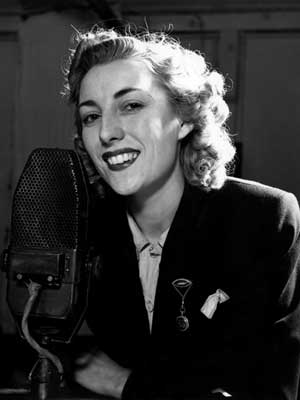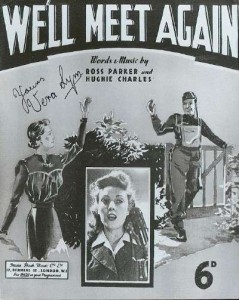What a Performance!
Our British Academy Postdoctoral Fellow Kate Guthrie consulted on a documentary for BBC 4, broadcasting this month. She writes about her experience:

In early September, I received out-of-the-blue an invitation to consult on a BBC 4 documentary. The producers were in the middle of filming a three-part series tracing the evolution of music hall in Britain, from its mid-19th-century roots, through the Golden Age of variety entertainment, to the working men’s clubs of the 1950s. For the final episode, they needed someone who knew about the 1940s, and in particular about vocalist Vera Lynn. Since an entire chapter of my PhD thesis had been dedicated to re-examining the singer’s role in wartime Britain, I was well placed to advise. It was the first time I’d had the opportunity to work with television; my excitement was mixed with trepidation.
Lynn is undoubtedly one of the better-remembered figures of the music hall stage: during the Second World War, she attained iconic status as the “Forces’ Sweetheart”, a title which remains hers to this day. But despite – or perhaps because of – her celebrity, Lynn has received relatively little attention from scholars. One of the consequences of this is that the image she now holds in the public imagination as a beacon of wartime national unity is not exactly historically accurate. The invitation to advise on the documentary offered a chance to reflect on why Lynn became so strongly associated with this period, as well as to share some of the largely forgotten controversies that surrounded her in 1940s Britain.
The two issues – on the one hand, her associations with the Second World War; on the other, her contested cultural status – were connected. When war broke out, the lack of public enthusiasm for another conflict was a source of deep concern for the British government. Official propaganda responded by pushing the idea of a “people’s war” – a war, that is, that was being fought for and by “the people”. Born to a working-class family, raised in the East End of London, and trained on the music club circuit from a young age, Vera Lynn was well placed to become a figurehead of such a war.
But if her humble origins and accessible vocal style made it easier for the public to relate to her, her widespread popularity made her profoundly unpopular with the British musical establishment. Critics dismissed her performances as “crooning”, a derogatory term that implied lowbrow trash and a complete lack of vocal technique. The vehemence of these attacks reached an all-time high in 1942, when a retired Colonel went so far as to suggest that her music was undermining soldiers’ ability to fight. Such effeminate, soporific, “slush”, he contended, was inappropriate music for war.
 Besides having the sensational appeal of a controversy, Vera Lynn’s individual story is interesting for the broader insight it offers into the place of entertainment within Second World War Britain. Variety certainly helped to maintain morale and provide amusement – often in usual venues, and occasionally by torchlight – during the long black-out evenings. Nevertheless, it remained a contentious art form. Far from disregarding long-standing debates in pursuit of national unity, critics took the war as an opportunity to reframe them, couching old issues in more timely terms.
Besides having the sensational appeal of a controversy, Vera Lynn’s individual story is interesting for the broader insight it offers into the place of entertainment within Second World War Britain. Variety certainly helped to maintain morale and provide amusement – often in usual venues, and occasionally by torchlight – during the long black-out evenings. Nevertheless, it remained a contentious art form. Far from disregarding long-standing debates in pursuit of national unity, critics took the war as an opportunity to reframe them, couching old issues in more timely terms.
In some ways, then, Lynn’s story is not so very different from those of the other, forgotten performers who feature in What a Performance. If posterity has looked more kindly on her, in her day she amused the masses and vexed the critics just as generations of music hall stars had done before her. But to hear their stories, you’ll have to watch the series.
What a Performance! Pioneers of Popular Entertainment is airing at 9pm on 3rd, 10th and 17th December, and will be available on iPlayer for a few weeks afterwards.
Watch a clip of Kate’s segment of the programme here.

